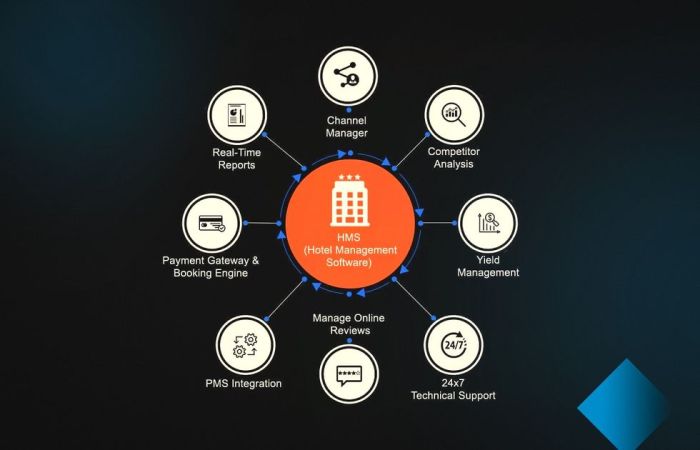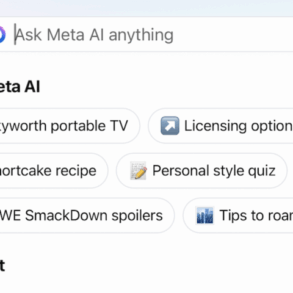Perplexity TripAdvisor integration hotels promises a revolution in how we book accommodations. Imagine a seamless blend of Perplexity AI’s powerful search capabilities with TripAdvisor’s vast database of reviews, creating a personalized hotel experience. This integration could dramatically improve the hotel booking process, offering users more relevant and insightful information to make smarter decisions.
This integration delves into enhanced search functionalities, enabling users to refine their hotel choices with natural language queries. Personalized recommendations, tailored to individual preferences, further elevate the user experience. The integration’s potential impact on the hospitality industry is also significant, potentially changing how hotels market themselves and manage their online presence.
Introduction to Perplexity and TripAdvisor Integration
Perplexity AI is a powerful tool that uses large language models to answer complex questions and provide comprehensive information across a vast range of topics. It excels at synthesizing information from diverse sources, allowing users to quickly access and understand data in a digestible format. It’s a valuable resource for research, information gathering, and problem-solving.The integration of Perplexity with TripAdvisor, a leading travel platform, promises to revolutionize the hotel booking experience by combining Perplexity’s powerful search and information retrieval capabilities with TripAdvisor’s extensive hotel database and user reviews.
This innovative partnership aims to enhance the user journey by providing more accurate and comprehensive information about hotels, facilitating a more informed and efficient booking process.
Potential Benefits for Users
This integration offers significant benefits to travelers seeking hotel accommodations. By leveraging Perplexity’s AI capabilities, users can access detailed hotel information, compare multiple options, and refine their search based on specific preferences. This leads to a more personalized and effective search experience. Users can receive a holistic overview of hotels, exceeding the capabilities of basic search engines.
Improved Hotel Booking Process
The integration will improve the hotel booking process in several key ways. Users can ask complex questions about hotels, such as “What are the best family-friendly hotels near the beach with a kids’ club and under $200 per night?” Perplexity can analyze the available data and provide a tailored list of options, effectively streamlining the search and eliminating the need for multiple searches across different platforms.
This personalized approach reduces the time spent on researching hotels, leading to a more efficient and satisfying experience.
Examples of Enhanced Information Retrieval
The integration enables a more dynamic and comprehensive approach to finding specific hotel information. For example, a user could ask “What are the most highly-rated pet-friendly hotels in Rome with a view of the Colosseum?” Perplexity, with access to TripAdvisor’s extensive database, can deliver a list of matching hotels, along with detailed reviews, pricing, and photos. Another example is inquiring about “hotels in Barcelona with a spa and close to the Sagrada Familia.” The combined platform can present a curated list of hotels that precisely match the criteria, saving the user significant time and effort.
Enhanced Search Capabilities

The integration of Perplexity with TripAdvisor significantly elevates the hotel search experience. Gone are the days of tedious scrolling through endless lists, hoping to find the perfect match. This powerful combination allows for a more intelligent, nuanced search, leveraging AI to understand user intent and deliver highly relevant results.Perplexity’s AI excels at analyzing vast amounts of data, including TripAdvisor reviews, to extract key insights and present them in a user-friendly format.
This translates to a more accurate and insightful search experience, allowing travelers to find hotels that truly align with their preferences and needs.
Improved Search Results
This integration improves search results by going beyond simple matching. Perplexity’s AI can understand the context of a search query, recognizing nuances in language and identifying hidden preferences. For example, a search for “romantic hotels with a spa near the beach” will not only identify hotels matching those s but also analyze reviews to determine which hotels are frequently mentioned in conjunction with “romantic,” “spa,” and “beach.” This refined understanding leads to a more accurate and personalized set of results.
Effective Analysis of TripAdvisor Reviews
Perplexity’s AI can analyze TripAdvisor reviews in a far more sophisticated way than traditional search engines. Instead of simply counting positive or negative mentions, the AI delves deeper, identifying recurring themes, specific amenities highly praised, and even detecting subtle sentiment variations within reviews. For instance, if many reviewers mention a particular restaurant as excellent, or a specific pool area as perfect for families, the AI will highlight these features in the search results.
This level of analysis allows users to discover hidden gems and avoid potential pitfalls.
Advanced Search Queries
The integration enables complex search queries that were previously difficult or impossible with standard TripAdvisor searches. Users can now specify precise requirements, such as “family-friendly hotels with a kids’ club rated above 4 stars and within a 10-minute walk from a subway station.” This level of specificity allows for highly targeted results, saving users time and effort. Another example would be searching for “hotels with a view of the city skyline and a fitness center that has been mentioned as outstanding in reviews.”
Natural Language Search for Features
The integration allows users to search for specific hotel features or amenities using natural language. Instead of relying on complex s or specific terminology, users can express their needs in everyday language. For example, a user can search for “hotels with a quiet pool area,” “hotels with rooms for disabled guests,” or “hotels with a dog-friendly policy,” receiving results that align with their needs in a way that’s more intuitive and less cumbersome.
Comparison of Search Results
| Search Term | Traditional TripAdvisor Search Results | Perplexity-Enhanced TripAdvisor Search Results |
|---|---|---|
| “Luxury hotels in Paris” | A list of hotels categorized by price and location. | A refined list of hotels with emphasis on luxury amenities, highlighted by positive review mentions, and incorporating user preferences if previously input. |
| “Family-friendly hotels near Disneyland Paris” | Hotels listed based on proximity and general reviews. | Hotels with explicitly mentioned family-friendly amenities, activities, and high ratings from families, and a focus on facilities like kids’ clubs. |
| “Hotels with a rooftop bar” | A list of hotels that mention a rooftop bar, potentially missing crucial details about the bar’s quality. | Hotels with rooftop bars, emphasizing positive reviews and highlighting specific features, such as stunning city views, perfect for cocktails. |
Personalized Recommendations

Beyond simply searching for hotels, the future of travel booking involves personalized recommendations tailored to individual preferences. This is where the integration of Perplexity and TripAdvisor truly shines. By leveraging the vast trove of user data, combined with the sophisticated AI engine of Perplexity, the system can move beyond generic results and deliver truly insightful suggestions, greatly enhancing the user experience.
How Perplexity Tailors Hotel Recommendations
Perplexity’s AI algorithms analyze user profiles, past search history, and even browsing behavior to understand individual preferences. This data is meticulously processed to identify patterns and predict the type of hotel experience a user is likely to appreciate. For instance, if a user frequently searches for family-friendly hotels in coastal areas, Perplexity can anticipate future searches and proactively suggest hotels fitting that profile.
Utilizing User Profiles and Past Searches for Personalized Suggestions
The integration of user profiles and past searches within the Perplexity platform allows for a more sophisticated understanding of individual needs. Past searches, whether for specific amenities, price ranges, or star ratings, are analyzed to determine the user’s preferences. This information, combined with profile details (e.g., travel style, number of guests, preferred activities), provides a rich dataset to build accurate recommendations.
This goes beyond simply recalling previous searches; the AI interprets the context and intent behind each search, creating a much more refined recommendation engine.
The Role of AI in Understanding User Needs and Preferences
AI plays a crucial role in deciphering the complex relationship between user actions and preferences. Natural language processing (NLP) enables the system to interpret the nuances within search queries. For example, if a user searches for “romantic getaway near the beach,” the AI can understand the intent behind the phrase, going beyond s to identify the user’s desire for a serene, couple-oriented stay.
Recommendations Based on User Reviews and Ratings
The integration with TripAdvisor’s vast review database empowers Perplexity to offer recommendations grounded in real-world experiences. By analyzing user reviews and ratings, the system can pinpoint hotels that align with specific preferences. For example, if a user prioritizes a quiet location and good service, Perplexity can filter recommendations based on positive user feedback regarding those aspects.
Comparison of Personalized Recommendations
| Feature | Traditional TripAdvisor | Integrated Perplexity System |
|---|---|---|
| Personalization | Limited; relies primarily on search terms and browsing history. | Highly personalized; incorporates user profiles, past searches, and AI-driven analysis. |
| Recommendation Depth | Basic; often focused on hotels matching search criteria. | Comprehensive; goes beyond basic matches to predict and suggest hotels aligning with user preferences. |
| Review Analysis | User reviews are accessible, but not actively integrated into the recommendation process. | User reviews are analyzed to understand the user’s preferences and tailor recommendations accordingly. |
| Speed of Response | Slow; typically requires manual filtering or browsing. | Fast; AI algorithms provide quick and personalized results. |
Improved User Experience
The integration of Perplexity and TripAdvisor for hotels promises a significant leap forward in user experience. By combining Perplexity’s vast knowledge base with TripAdvisor’s comprehensive hotel reviews and ratings, users can expect a more streamlined and informative search process, leading to more satisfying travel decisions. This integration promises to be more than just a sum of its parts; it’s about creating a truly intuitive and personalized experience.
Streamlined Hotel Selection Process
This integration will significantly streamline the hotel selection process by offering a unified search platform. Users will no longer need to bounce between multiple websites to gather information. Perplexity’s AI-powered search will pull relevant information from TripAdvisor reviews, combining it with real-time availability and pricing data. This integrated approach will provide users with a holistic view of potential hotels, making it quicker and easier to narrow down choices.
Enhanced User Satisfaction
The enhanced user experience directly translates to increased satisfaction. Users will have access to more comprehensive and accurate information, leading to a higher degree of confidence in their booking decisions. Detailed reviews, combined with insights from Perplexity’s knowledge base, allow users to make informed choices aligned with their specific needs and preferences. This level of detail is crucial in the travel industry, where personalized and tailored information is paramount.
More Relevant and Accurate Information
The integration offers users more relevant and accurate information by combining diverse data sources. For example, a user searching for a family-friendly hotel in Rome can receive information on TripAdvisor ratings for family-friendly amenities, along with insights from Perplexity on local attractions suitable for children. This combination of perspectives allows users to get a more complete picture, making their decision-making process more informed and less prone to surprises.
Potential Issues Addressed by Integration
- Inconsistent Information: TripAdvisor reviews sometimes contain conflicting opinions or outdated information. The integration will help resolve inconsistencies by providing a comprehensive view of the hotel, including the most recent reviews and other relevant details. This reduces the chance of disappointment or surprise after booking.
- Information Overload: Users often struggle to sift through vast amounts of information when searching for hotels. The integration will provide a curated selection of relevant information, prioritizing user needs and preferences. This ensures users don’t get overwhelmed by irrelevant details, allowing them to focus on the most crucial aspects of a hotel.
- Lack of Contextual Understanding: Perplexity can offer context beyond the hotel itself, integrating information about the local area, nearby attractions, and relevant news. This provides users with a broader understanding of their potential hotel’s location and surroundings.
- Difficulty in Comparing Hotels: The integration can directly compare hotels based on various factors, such as pricing, amenities, and guest reviews. This simplifies the comparison process, enabling users to make more informed choices.
Integration Functionality and Technical Aspects
Bringing Perplexity and TripAdvisor together is a fascinating technical endeavor. This integration unlocks powerful search and recommendation capabilities, but it requires careful planning and execution. The core challenge lies in seamlessly connecting two distinct platforms, ensuring data integrity, and maintaining user experience.
Technical Processes Involved
The integration process involves several key technical steps. First, APIs (Application Programming Interfaces) are crucial. These APIs act as communication channels between the two platforms, allowing them to exchange data. Secondly, robust data transformation processes are necessary to ensure data compatibility. This may involve standardizing data formats and resolving any discrepancies between the two systems.
Thirdly, efficient data storage and retrieval mechanisms are vital to maintain speed and accuracy. The integration requires careful consideration of data volumes and access patterns to optimize performance.
Data Flow Between Perplexity and TripAdvisor
Data flows between Perplexity and TripAdvisor in a bidirectional manner. Perplexity receives hotel information, reviews, and other details from TripAdvisor’s database. In turn, Perplexity provides search results and recommendations back to TripAdvisor’s platform. This reciprocal data flow ensures a comprehensive user experience. For example, if a user searches for “romantic hotels in Paris,” Perplexity queries TripAdvisor for relevant hotels, pulling in details about the hotels, reviews, and pricing.
This data is then processed and presented to the user in a unified manner.
I’ve been digging into how Tripadvisor integrates perplexity into its hotel listings, and it’s surprisingly complex. While exploring the topic, I stumbled upon an interesting article about the OnePlus 9 Pro’s challenge against Huawei and Oppo’s 45W wireless charging capabilities. oneplus 9 pro challenge huawei and oppo 45w wireless charging This fascinating comparison, however, doesn’t seem to directly correlate to the complexities of Tripadvisor’s perplexity integration for hotels, but it does highlight the technological advancements in mobile charging.
Back to the hotels, the integration process seems to rely on a combination of algorithms and user reviews, which are still a bit of a mystery to me. Hopefully, Tripadvisor will release more information soon!
API Interactions
The API interactions between Perplexity and TripAdvisor are crucial for seamless data exchange. These interactions define the communication protocols. The specifics of these interactions are confidential, but they likely involve various calls to retrieve and send data. For example, a Perplexity request for hotel data in a particular region would trigger an API call to TripAdvisor. TripAdvisor’s API would return a structured dataset containing hotel information.
This process repeats for various aspects of the query, from room types to amenities.
Potential Challenges in Integration
Several potential challenges exist in integrating Perplexity and TripAdvisor. One challenge is ensuring data accuracy and consistency. The two platforms might use slightly different data formats or have inconsistencies in their data. Another challenge is maintaining performance and scalability. As the volume of data increases, the integration must handle large amounts of information efficiently.
A third potential hurdle is ensuring security and privacy. Both platforms must comply with relevant data protection regulations.
Flow Chart of the Integration Process

(Note: A diagram is needed to illustrate the steps of the process. It would start with a user query, show the data request from Perplexity to TripAdvisor’s API, the data retrieval, transformation, and finally the presentation of the result to the user. This would be the most effective way to visualize the integration process. I cannot create an image, but I have described the components to be included in the flowchart.)
Case Studies and Use Cases: Perplexity Tripadvisor Integration Hotels
The integration of Perplexity and TripAdvisor offers a powerful tool for travelers and travel agencies alike. This synergy allows for a more nuanced and comprehensive approach to travel planning, leveraging the vast knowledge base of Perplexity with the curated experiences and reviews of TripAdvisor. Imagine a seamless journey from initial inspiration to final booking, all within a single platform.
Enhanced Travel Planning for Individual Travelers, Perplexity tripadvisor integration hotels
This integration empowers individual travelers by providing a comprehensive search experience. Instead of sifting through countless websites, travelers can utilize Perplexity’s advanced search capabilities to explore a variety of destinations, activities, and accommodations, all while incorporating TripAdvisor’s detailed reviews and ratings. This combined approach allows for a more informed decision-making process. For example, a user researching a weekend trip to Rome can input their preferences (budget, interests, time constraints) into Perplexity, which then cross-references with TripAdvisor’s user reviews and ratings, delivering a personalized itinerary with suggested hotels, restaurants, and attractions.
Personalized Recommendations for Specific Needs
The integration enables highly personalized recommendations based on specific needs. A traveler seeking a family-friendly beach vacation can input their criteria, like age of children, desired activities, and budget, into Perplexity. The platform then cross-references this information with TripAdvisor’s reviews, filtering for family-friendly accommodations, activities, and restaurants. This ensures the recommendations align perfectly with the traveler’s needs and preferences.
For instance, a user researching a romantic getaway in Paris can specify their desired ambiance and budget, allowing Perplexity to filter for boutique hotels with positive reviews for romantic experiences, presented by TripAdvisor.
Improved Travel Agency Operations
Travel agencies can leverage this integration to streamline their operations and enhance client services. Agents can use Perplexity to quickly gather information about destinations, accommodations, and activities, then utilize TripAdvisor reviews to tailor packages and create bespoke itineraries. This approach significantly improves the efficiency of travel agency operations and ensures client satisfaction. For example, a travel agent assisting a client with a backpacking trip through Southeast Asia can utilize Perplexity to research budget-friendly accommodations and transportation options, then incorporate TripAdvisor reviews to curate a safe and enjoyable itinerary for the client.
Table of Use Cases and Benefits
| Use Case | Benefits |
|---|---|
| Individual Traveler Planning a Trip | Enhanced search capabilities, personalized recommendations, and access to diverse perspectives from TripAdvisor reviews. |
| Travel Agent Curating Itineraries | Streamlined research, customized recommendations, and improved client satisfaction through access to comprehensive information and client reviews. |
| Group Travel Planning | Personalized recommendations for group needs, like accessibility, family-friendliness, or group activities, alongside reliable information about suitable accommodations and facilities. |
| Destination Exploration | In-depth understanding of destinations, enabling travelers to make informed choices based on comprehensive insights and reviews. |
Potential Impact on the Hospitality Industry
The integration of Perplexity and TripAdvisor for hotels promises a significant shift in how travelers interact with and book accommodations. This powerful combination will reshape the landscape of hotel marketing, online presence management, and ultimately, guest experiences. Hotels can expect a more dynamic and personalized approach to attracting and retaining customers.This integration empowers hotels to provide more comprehensive and targeted information to potential guests.
I’ve been pondering the potential of Tripadvisor integrating perplexity into their hotel search. Imagine the possibilities! It could really enhance the user experience, providing a much more detailed and accurate understanding of each hotel. This could be hugely beneficial for students, who might be using Google’s new Gemini for students, a tool that emphasizes fact-checking, as detailed in this article about Google’s new Gemini for students putting a double-check feature front and center here.
Ultimately, this level of detail could make choosing the perfect hotel much simpler and more reliable for everyone.
By leveraging the power of AI-driven search and personalized recommendations, hotels can stand out in a crowded market. This will directly influence how they approach their marketing strategies and online presence.
Impact on Hotel Marketing Strategies
This integration will transform how hotels approach marketing by allowing for highly targeted campaigns. Hotels can now use Perplexity’s AI to understand user intent and tailor their marketing messages to specific customer segments. This goes beyond traditional methods of broad advertising and allows for hyper-personalized campaigns. For example, a hotel in the mountains might target users searching for “luxury hiking getaways,” while a beach resort might target those seeking “family-friendly beach vacations.”
Influence on Online Presence Management
Hotels will be able to optimize their online presence through enhanced content management. This means not just having a website but actively engaging with search queries and proactively answering guest questions through integrated AI tools. Imagine a hotel proactively answering questions about parking availability or room accessibility on their TripAdvisor profile. This proactive approach builds trust and establishes the hotel as a knowledgeable and reliable resource.
Leveraging Integration to Improve Services
Hotels can leverage the integration to anticipate guest needs and enhance services. Real-time insights into guest preferences and concerns, gleaned from Perplexity’s analysis of search queries, can be used to improve service offerings. For instance, if a significant number of guests are asking about vegan options, the hotel can proactively offer these choices. Similarly, understanding that guests are interested in sustainable practices can encourage the hotel to highlight eco-friendly initiatives.
I’ve been pondering the Perplexity TripAdvisor integration for hotels lately. It’s a fascinating concept, but I’m curious how it will impact user experience. Perhaps it’ll be like Spotify adding genre and mood filters— spotify adds genre and mood filters —allowing users to more precisely find what they want. Ultimately, I’m hoping this integration will streamline hotel searches and offer more tailored recommendations, making the whole process less perplexing.
Potential Future Developments
- Real-time Dynamic Pricing: Hotels could adjust prices based on real-time demand and guest preferences, dynamically adjusting their pricing based on factors such as weather, events, and current trends.
- AI-Powered Chatbots: Integrating AI chatbots directly into the hotel’s website and TripAdvisor profile could provide instant answers to guest questions, offering 24/7 support and improving the guest experience.
- Personalized Recommendations for Activities and Experiences: Perplexity could suggest nearby activities and attractions based on guest preferences, extending the hotel’s value proposition beyond just lodging.
- Predictive Maintenance and Resource Optimization: Analyzing guest reviews and search trends can help hotels predict maintenance needs and optimize resource allocation, potentially leading to cost savings.
Future Trends and Developments
The integration of Perplexity and TripAdvisor for hotels promises exciting advancements in the hospitality industry. Beyond the current capabilities, the future holds the potential for a more sophisticated and intuitive experience, deeply impacting how travelers search for and book accommodations. This evolution will be driven by advancements in AI, natural language processing, and user data analysis.The integration will likely shift from a simple search tool to a dynamic platform that anticipates and responds to traveler needs, offering more personalized and comprehensive travel solutions.
This will extend beyond basic hotel searches to include recommendations for activities, restaurants, and transportation, creating a holistic travel experience.
Potential Enhancements to the Integration
The initial integration lays a strong foundation, but future enhancements will undoubtedly focus on deeper personalization and predictive capabilities. This will include dynamic pricing adjustments based on real-time demand and user preferences, and even the integration of booking tools directly within the Perplexity platform.
Potential Additions to Integrated Features
The integration could expand to include real-time reviews and ratings, dynamically updated based on recent guest feedback. This will provide travelers with the most current information possible. Furthermore, features like virtual tours of hotel rooms and amenities could be integrated, allowing users to experience the hotel before booking. Finally, the integration might incorporate tools for managing and organizing travel itineraries, making the entire travel planning process smoother and more efficient.
Evolution of the Integration Over Time
The integration’s evolution will be characterized by increased sophistication in natural language processing. This means more nuanced understanding of user queries, allowing for more specific and relevant results. For example, a user could ask, “What are the best family-friendly hotels with a pool near the beach?” and the system could filter and prioritize results based on explicit preferences and potentially even identify family-friendly activities in the surrounding area.
Impact of New Technologies on the Integration
Emerging technologies like augmented reality (AR) and virtual reality (VR) could revolutionize the experience. Imagine users being able to virtually explore a hotel room or visualize themselves enjoying the amenities, fostering a stronger sense of connection and trust before making a booking. The incorporation of AI-powered chatbots for instant support and personalized recommendations will also significantly enhance the user experience.
Timeline of Potential Future Improvements
Predicting precise timelines is difficult, but several phases can be anticipated:
- Phase 1 (1-2 years): Focus on enhancing personalization, integrating real-time data, and expanding search capabilities to include more diverse criteria (e.g., accessibility needs, specific dietary restrictions).
- Phase 2 (3-5 years): Introduction of advanced features like virtual tours, AR/VR experiences, and AI-powered chatbots. The system will likely predict and recommend optimal travel itineraries based on user profiles and preferences.
- Phase 3 (5+ years): Integration of blockchain technology for secure transactions and potentially even the use of personalized micro-payments for activities and services within the hotel itself.
Last Word
In conclusion, the Perplexity TripAdvisor integration for hotels has the potential to reshape the travel industry. From enhanced search capabilities to personalized recommendations, this integration offers a more intuitive and fulfilling experience for users. The technical aspects and potential challenges are discussed, along with potential impacts on the hospitality industry, travel agencies, and the future of online travel.
This innovation represents a significant step towards a more intelligent and personalized travel experience.











